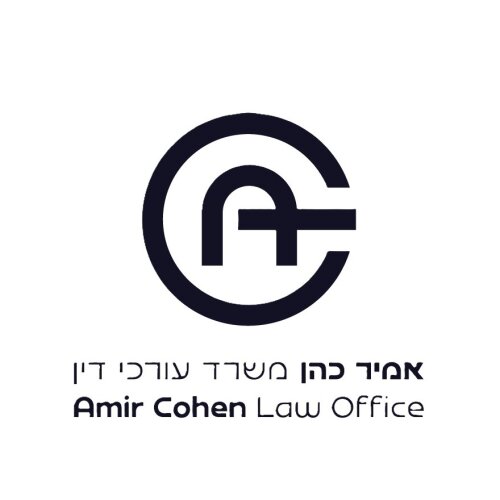Best Father's Rights Lawyers in Tel Aviv
Share your needs with us, get contacted by law firms.
Free. Takes 2 min.
Free Guide to Hiring a Family Lawyer
List of the best lawyers in Tel Aviv, Israel
About Father's Rights Law in Tel Aviv, Israel
Father's Rights law in Tel Aviv, Israel, concerns legal issues related to the rights and responsibilities of fathers, particularly in cases of divorce, child custody, and child support. The legal framework aims to ensure that fathers are treated fairly and equitably in family disputes, reflecting changes in societal attitudes that recognize the important role fathers play in their children's lives. Understanding local laws and regulations is crucial for fathers seeking to protect their rights and maintain a healthy relationship with their children.
Why You May Need a Lawyer
There are several common situations where seeking legal advice in the realm of Father's Rights can be essential:
- Child Custody Disputes: When parents separate or divorce, determining child custody can become contentious. Legal assistance can ensure that the father's rights are considered and that a fair arrangement is reached.
- Child Support Issues: Calculating and enforcing child support payments may require legal intervention to ensure that obligations are met in a manner that reflects the father's financial situation.
- Divorce Proceedings: Divorce can involve complex legal issues, and an experienced lawyer can help protect the father's interests regarding property division, alimony, and other relevant matters.
- Parental Alienation: When one parent attempts to turn a child against the other parent, legal action may be required to address this harmful behavior.
- Paternity Issues: Establishing paternity is necessary for a father to claim his rights. Legal guidance can help navigate this process effectively.
Local Laws Overview
Key aspects of local laws in Tel Aviv, Israel, relevant to Father's Rights include:
- Custody and Visitation: Israeli law generally favors joint custody arrangements, promoting the involvement of both parents in the child's upbringing. The best interest of the child is the primary consideration.
- Child Support: Fathers may be required to provide child support, with amounts calculated based on income and the child's needs. Legal mechanisms are in place to ensure compliance.
- Divorce Law: The Rabbinical Court handles Jewish divorce cases, and secular matters can be addressed in Family Courts. Both require adherence to specific legal standards.
- Parental Rights: Fathers have the right to spend time with their children and be involved in major decisions affecting the child's life, such as education and healthcare.
- Paternity Claims: Fathers may need to establish paternity through legal procedures to secure their rights and responsibilities towards the child.
Frequently Asked Questions
1. How is child custody determined in Tel Aviv, Israel?
Child custody is determined based on the best interest of the child, considering factors such as the child's needs, the parental abilities of each parent, and the existing parent-child relationships.
2. Can a father get full custody of his child?
While full custody is less common, it is possible if it is proven that it will significantly benefit the child's welfare. Courts typically prefer joint custody arrangements.
3. What factors influence child support calculations?
Child support is calculated based on the father's income, the child's needs, and the financial situation of both parents. The aim is to provide appropriate support for the child's upbringing.
4. How can a father protect his visitation rights?
A father can protect his visitation rights by obtaining a legally binding visitation agreement through the courts, which can be enforced if not honored.
5. What should a father do if his ex-partner is alienating his child from him?
Parental alienation is a serious issue. A father should seek legal advice to address the situation and may need to involve the courts to protect his relationship with his child.
6. How can a father establish paternity?
Paternity can be established through voluntary acknowledgment or by court order, often involving DNA testing. Legal advice can guide the best approach based on the circumstances.
7. Are fathers entitled to parental leave in Israel?
Yes, fathers are entitled to parental leave under certain conditions, allowing them time off work to care for their newborn or newly adopted child.
8. How can a father modify a child support order?
If circumstances change, such as a significant alteration in income or the child's needs, a father can request a modification of the child support order through the courts.
9. Can a father object to his child being relocated by the other parent?
Yes, a father can object to relocation if it significantly impacts his visitation rights or the welfare of the child. The matter may need to be resolved in court.
10. What is the process for appealing a court decision on custody or support?
If dissatisfied with a court decision, a father can file an appeal within a specified time frame. Legal assistance is advisable to navigate the appellate process effectively.
Additional Resources
Several resources are available for fathers seeking legal advice in Tel Aviv, Israel:
- Israel Bar Association: Provides referrals to qualified family law attorneys.
- Ministry of Justice: Offers information and resources related to family law.
- Local Family Courts: Can provide guidance on legal procedures and services available.
- Father's Rights Organizations: Non-profits and advocacy groups offer support and information.
Next Steps
If you need legal assistance in Father's Rights, consider the following steps:
- Consult an Attorney: Seek a family law attorney experienced in Father's Rights to discuss your case and explore your options.
- Gather Documentation: Collect relevant documents, such as financial records, communication logs, and any legal paperwork to support your case.
- Understand Your Rights: Educate yourself on your legal rights and responsibilities to make informed decisions.
- Take Legal Action: If necessary, proceed with legal action to protect your rights and ensure a fair outcome.
Lawzana helps you find the best lawyers and law firms in Tel Aviv through a curated and pre-screened list of qualified legal professionals. Our platform offers rankings and detailed profiles of attorneys and law firms, allowing you to compare based on practice areas, including Father's Rights, experience, and client feedback.
Each profile includes a description of the firm's areas of practice, client reviews, team members and partners, year of establishment, spoken languages, office locations, contact information, social media presence, and any published articles or resources. Most firms on our platform speak English and are experienced in both local and international legal matters.
Get a quote from top-rated law firms in Tel Aviv, Israel — quickly, securely, and without unnecessary hassle.
Disclaimer:
The information provided on this page is for general informational purposes only and does not constitute legal advice. While we strive to ensure the accuracy and relevance of the content, legal information may change over time, and interpretations of the law can vary. You should always consult with a qualified legal professional for advice specific to your situation.
We disclaim all liability for actions taken or not taken based on the content of this page. If you believe any information is incorrect or outdated, please contact us, and we will review and update it where appropriate.

















